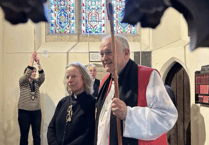LOCAL NHS chiefs hope they’re about to reach “peak busyness” as staff shortages continue to hit Frimley Park Hospital.
Despite Frimley Health NHS Foundation Trust having “one of the highest levels of Covid occupancy in the region”, John Seymour, its interim managing director of operations, said non-Covid work and staff sickness had proved to be bigger challenges than the virus itself.
At the moment 360 staff are absent with Covid or isolating, chief executive Neil Dardis told the trust’s board of directors at their meeting last Friday.
More than 650 were absent because of Covid and other causes on January 6, about triple the sickness levels seen in a usual winter.
About 9,000 staff are employed across the trust’s three main hospitals – Frimley Park, Heatherwood at Ascot and Wexham Park in Slough.
The absences are on top of a 7.8 per cent vacancy rate recorded in November 2021, and some non-urgent elective care has had to be rearranged.
Another challenge, said Mr Seymour, was the large volume of medically fit patients in hospital because of problems in the social care system.
“The big impact we had last winter – that wave of pressure is still ongoing now and it’s going to take a while to ripple through,” he said.
But he added: “We’re hopefully reaching around about the peak busyness at this point, touch wood – in which case we can then begin planning, getting staff back off sickness and rebuilding those elective surgeries.”
Non-executive director John Weaver told him: “I’m in absolute awe of the quality of the planning and the juggling, which is almost an impossible situation.”
Mr Dardis reported to the board: “I am acutely aware our teams are fatigued after what seems like a relentless two years.
“Intensive Care Units are abating slightly now; we were at one point over 150 per cent above our usual capacity.
“That clearly had an impact on our elective work but I’m really proud that as ever our staff have been absolutely amazing and we’ve had the highest activity levels in the past couple of weeks across the region.”
It is hoped expanding their use of robotic surgery will increase the trust’s daily surgical capacity by as much as a third, as keyhole operations take less time than open surgery.
A new da Vinci Xi system delivered in November is being used in urology, colorectal and gynaecology procedures.
Consultant urologist Muddassar Hussain, the first surgeon to use it, said the smaller incisions meant less pain after surgery.
He said: “One of the most common operations we will use it for is partial nephrectomies which is where a cancerous part of the kidney is removed, and the remaining kidney is repaired with stitches.
“Operating with the da Vinci robot allows most of these patients to go home after only a single overnight stay, in comparison to open surgery which could result in a stay of up to five nights.”




